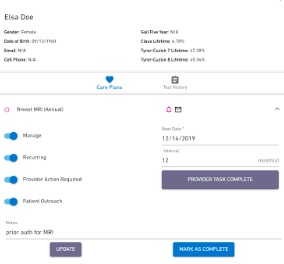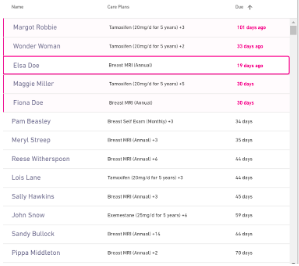CHRISTUS Ochsner Lake Area Hospital's Wellness, Screening, and Genetics Center in Lake Charles, Louisiana is impacting their entire population through cancer risk assessment.
The Wellness, Screening, and Genetics Center screens patients for their genetic screening eligibility and have genetically tested over 1,700 patients. On average, the center sees well over 100 patients a week with 70%-80% of patients being eligible for genetic services. This is remarkable, as centers usually find about 20% of patients eligible.
With this incredible volume of genetic testing information to manage, nurse navigator Leah Marcantel, RN, CN-BN, has thousands of patients relying on her for follow-up care — a lot more than your traditional nurse navigator tracking newly diagnosed cases. Leah is responsible for ensuring each patient tested receives a personalized cancer prevention plan and assisting patient compliance with the plan. With her large volume of patients, she must have an accurate way to manage every patient.
"The CancerIQ Manager was the biggest thing to help me know I am not missing or overlooking anyone," Leah said.
This post shows how CHRISTUS Ochsner was able to manage their growing population of high-risk patients using software and reactivate their genetic testing program.
The Goal: The program was never just about genetic testing, it was about proactive prevention
The Wellness, Screening, and Genetics Center is a perfect example of the personalized health care (PHC) approach to medicine, where according to Simmons et al, “prediction, prevention, intense patient engagement, shared health care decision making, and coordination of care are essential to cost effectively facilitate better outcomes.”
The program goal is to be proactive, and increase the likelihood of an early diagnosis of cancer by starting the cancer prevention discussion with patients earlier. The program is not just about genetic testing, it's about proactive prevention.
As shown in the exhibit below, the personalized health planning process is far more than a diagnostic workup and risk assessment— but also the ability to engage in shared decision-making and ongoing follow-up.
The Challenge: Managing testing results and different cancer prevention plans
CHRISTUS started the program in collaboration with a genetic testing lab able to provide initial resources to identify patients meeting testing criteria and deliver results that clearly laid out medical management options for each patient. However, managing testing results and different cancer prevention plans proved challenging.
With those initial resources in place, the program allowed patients to gather their family history, speak with a tele-genetic counselor, and ultimately learn about their hereditary cancer risk.
CHRISTUS was doing a great job screening patients, but needed an effective way to manage them. Ineffectively managing patients has several consequences:
● Lower patient satisfaction
● Higher stress placed on physicians
● Lost revenue to patients going elsewhere
To avoid these consequences and complete the most impactful stages of the process — shared goal setting, personalized health planning, and follow-up — Leah needed more help.
The Solution - Going Digital with CancerIQ
The CancerIQ platform not only helps with the initial family history data gathering, but truly supports closed loop care, from screening to medical management:
Shared-Decision Making and Personalized Planning
Leah specifically pointed out the CancerIQ Care Plan features as part of the process change that has made an impact at CHRISTUS.
Instead of filing away a static genetic test report that lists out a range of appropriate options for the patient, CancerIQ serves up a dynamic list of evidence-based care plans clinicians can discuss with the patient at the point of care.
"The care plan has been amazing because I can click whatever meets criteria for the patient and whatever the patient wants to do."
After the discussion, Leah can easily document the surveillance or risk reduction strategy the patient chose and begin tracking the patient’s adherence with that initial plan.
Enabling Proactive Patient Care with Specific Dates

The care plans in the CancerIQ Specialist immediately flow over to the CancerIQ Manager, where Leah can determine the appropriate timing for follow-up and proactive reminders.
She has the ability to give herself a patient reminder, and if the patient would like to receive email reminders, Leah has the ability to set that up too.
Know What is Due When
Prior to CancerIQ, Leah used Excel spreadsheets with several columns trying to track when certain screenings and procedures were due. It was manageable when there were only a few dozen patients, but at the clinic’s current volume — the spreadsheet became a source of stress for her.
The CancerIQ Manager has a visual interface to see when patients are due for follow-up, and when patients are non-compliant or overdue.

"CancerIQ has helped with knowing which patients are due for which follow-up with this large volume of patients," Leah said. She added, "If I didn't have CancerIQ, I'd be a lot more anxious trying to keep up with all of this follow-up."
The Impact of CancerIQ at CHRISTUS
Clinical Impact
The center was starting to scale back its initial screening and genetic testing efforts because of the sheer volume of results to manage.
With confidence that CancerIQ could improve the management of patient test results, Leah has been a champion for growth in testing activity. In October 2019, CHRISTUS’ first breast cancer awareness month with CancerIQ, the health system tested a record-breaking 196 patients — nearly double their monthly average since inception of the program. Since then, CHRISTUS has continued to expand the point-of-care program to screen patients in primary care settings and to screen for eight common types of cancer that have overlapping genetic risk factors.
Financial Impact
To continue to expand, Leah needs to report on all the downstream revenue opportunities attributable to the program.
With CancerIQ, it is easy for her administrative leadership to estimate and forecast revenue opportunities on a regular basis. Below is an example of a weekly report generated by the system that Leah shares internally:
“It is nice to see how many patients are due and see who is coming in next month for an MRI. We can see how much we are going to generate in revenue.”
Screening patients is powerful, but does not solve the entire puzzle. The real impact comes in patient management. Are you interested in learning more about how you can effectively manage patients in preventative care? Hear from one of our earliest adopters in this presentation.
